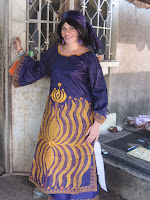Following this whole episode, I was then invited to a cow party (direct translation) in the cow fields where the snake had been found. At first I thought it was a joke because my family gets a thrill out of teasing me; however when the women spent the whole afternoon pounding salt with leaves and Guava, I discovered something was definitely going on. Despite my fear of going out into the land of snakes, I had to see what this cow party was all about. My family told me they were leaving at 6am the following morning, so at 5:45am I was drinking my instant Starbucks coffee (Thanks cay and mom) ready to party with the cows. Of course, silly me, 6am really means 8am so at about 9am after a 3 mile hike, I was there. It was the first time I had taken this new road and I found it absolutely beautiful. At times it became a river because of its proximity to the rice fields, but as we traveled further and further the scenery changed into a sparse forest where honey bees were busy working and the aroma of a sweet something was dancing in the wind. Just as I was enjoying the peace fullness of the moment, I started to hear the moos.
It was harmonious and the closer we got, the louder it became. My brothers explained that the cows could smell the salt and therefore they were singing to celebrate. Once we arrived, we dug ditches that were filled with water and mixed with mashed leaves, guava, salt and a type of tree bark. It became a gooey substance intended to give the cows good health. After this was prepared and the cows were milked, they untied them. With in seconds there was a stampede into the forest One of my brothers did a little dance while shouting at the cows. It was hysterical to watch and I wish I had a camera to video. After the cows drank, my brothers threw some other leaf salt mix water on them because, quote "it's good for their bodies". One of the ditches happened to be next to a swamp and I think i actually witnessed quick sand. The cows started sinking and my brothers had to rush in to help them. I was curious to find out more about quick sand so I have included a link to an article written about it.
http://africa.gm/africa/article/2008/1/10/how-quicksand-works
After it was over they sat in a circle with their hands facing the heavens. They shouted thanks to Allah and asked for the cows to be happy and healthy. I still don't know if this whole event was the result of the snake being found or just a coincidence, but it was all quite a bizarre and interesting day. Seeing as I did not run into a relative of the dead snake next to my hut it didn't end too badly.








